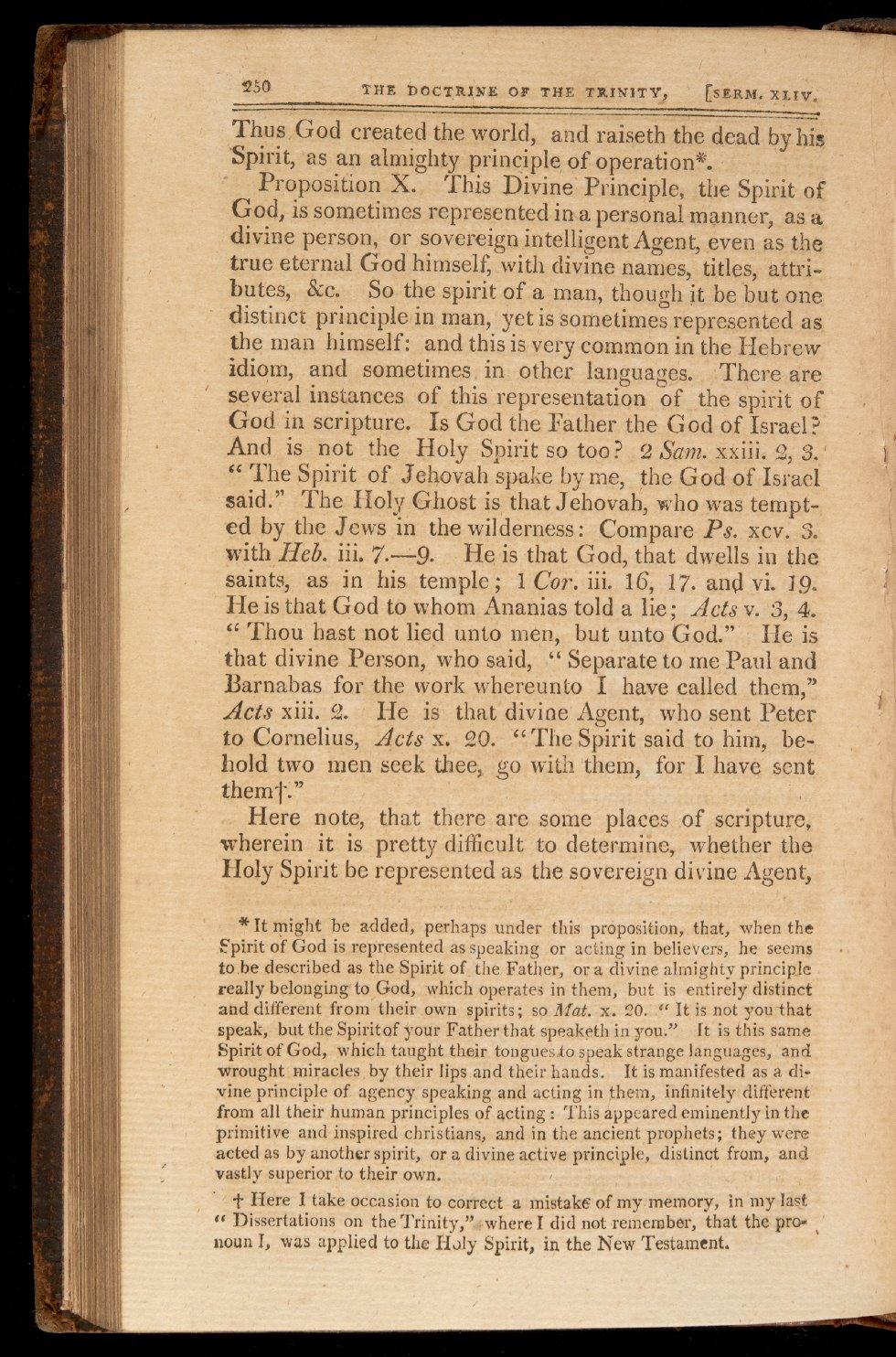

250
THE DOCTRINE
OP
THE
TRINITY,
[SEEM. XLIV.
Thus God
created
the world,
and raiseth the dead
by
his
Spirit,
as
an almighty principle
of
operation
*.
Proposition
X.
This
Divine
Principle, the Spirit
of
God,
is
sometimes
represented in
a
personal manner,
as
a
divine person, or
sovereign intelligent Agent, even
as
the
true eternal
God
himself, with
divine names,
titles,
attri-
butes,
&c.
So
the spirit
of
a
man,
though
it
be
but
one
distinct principle
in
man, yet
is
sometimes
represented
as
the
man himself:
and
this
is
very
common in the
Hebrew
idiom,
and
sometimes
in
other
languages.
There are
several instances
of
this
representation of
the spirit
of
God
in
scripture. Is
God
the
Father the God of Israel?
And
is
not
the
Holy
Spirit
so
too?
2 Sam.
xxiii.
2,
3.'
"
The Spirit
of
Jehovah
spake
by
me,
the
God of Israel
said."
The
Holy
Ghost
is
that
Jehovah,
who was
tempt-
ed
by
the
Jews
in
the wilderness: Compare
Ps.
xcv.
3.
with Heb.
iii.
7.
-9.
He
is
that
God,
that
dwells in
the
saints,
as in
his
temple;
1
Cor.
iii. 16,
17.
and
vi. 19.
He
is
that
God
to
whom
Ananias
told
a
lie;
Acts
v.
3,
4.
"
Thou
hast
not
lied
unto
men,
but
unto
God." He
is
that
divine
Person,
who said,
Separate
to me
Paul and
Iiarnabas for
the
work
whereunto
I
have
called them,"
Acts
xiii.
2.
He
is
that
divine
Agent,
who
sent
Peter
to Cornelius,
Acts
x.
20.
"The
Spirit
said to
him,
be-
hold
two
men seek
thee, go with them,
for
I
have
sent
them
t."
Here
note,
that there are
some
places
of
scripture,
wherein
it
is
pretty
difficult
to
determine, whether the
Holy Spirit
be
represented
as
the sovereign
divine Agent,
*
It
might be added,
perhaps
under
this proposition,
that,
when
the
F.piritof
God
is
represented
as
speaking or
acting
in believers, he
seems
tube
described
as
the Spirit of the Father, or
a
divine almighty principle
really belonging'to
God,
which operates
in
them, but
is
entirely distinct
and
different
from
their
own
spirits;
so
Mat.
x.
20.
"
It
is
not you
that
speak, but the Spirit of your
Fatherthat
speaketh
in
you."
It
is
this same
Spirit
of God, which
taught their tonguesto
speak
strange languages,
and
wrought
miracles by
their
lips
and their hands.
It
is
manifested
as
a
di-
vine principle
of
agency speaking and acting
in
them,
infinitely different
from all
their human principles
of acting
:
This appeared eminently
in
the
primitive and
inspired christians, and
in
the ancient prophets;
they
were
acted
as
by another spirit, or
a
divine active
principle, distinct
from,
and
vastly superior
to
their
own.
f
Here
I take occasion
to
correct
a
mistake
of
my memory,
in
my
last
"
Dissertations on
the
Trinity,"
-
whereI
did not remember,
that
the pro-
noun I, was applied to
the Holy Spirit, in the New Testament.

















